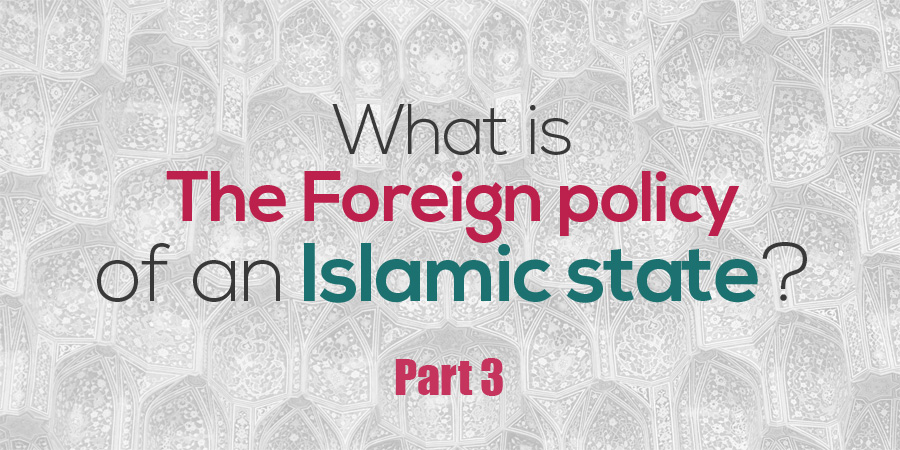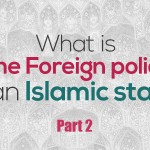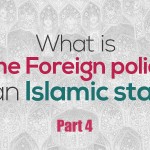What is the Foreign Policy of an Islamic State? (3)
 Independence of the Ummah, its Relations with Non‑Muslim Countries
Independence of the Ummah, its Relations with Non‑Muslim Countries
We propose to discuss a number of issues in this part of our discussion:
Islamic Unity
Islam considers all Muslims as one ummah:
وَإِنَّ هَٰذِهِ أُمَّتُكُمْ أُمَّةً وَاحِدَةً وَأَنَا رَبُّكُمْ فَاتَّقُونِ
“And surely this ummah (community) of yours is one ummah, and I am your Lord, and be dutiful to Me.” (23:52)
وَكَذَٰلِكَ جَعَلْنَاكُمْ أُمَّةً وَسَطًا لِّتَكُونُوا شُهَدَاءَ عَلَى النَّاسِ وَيَكُونَ الرَّسُولُ عَلَيْكُمْ شَهِيدًا
“And thus We have made you a midmost nation that you may be the bearers of witness to the people, and that the Apostle may be a bearer of witness to you; ….” (2:143)
The criterion of the unity of Muslims is nothing but faith and conviction, and they belong to nothing but Islam. Hence the differences related to racial, national, linguistic, regional, urban, and rural distinctions cannot and should not divide Muslims and alienate them from one another.
Among Muslims a deep‑rooted feeling of oneness exists that binds them together and they live like an integrated whole and foster brotherly feeling for one another. The Qur’an stresses this brotherly relationship in the following words:
إِنَّمَا الْمُؤْمِنُونَ إِخْوَةٌ فَأَصْلِحُوا بَيْنَ أَخَوَيْكُمْ ۚ وَاتَّقُوا اللَّهَ لَعَلَّكُمْ تُرْحَمُونَ
“The believers are but brethren, therefore make peace between your brethren and be God‑fearing that mercy may be showed to you.” (49:10)
In Islam there are no multiple communities; there is only one ummah. They strive for one and the same goal. All Muslims are one ummah against their common enemy, i.e. the global pagan system.
Islam ‑ a Perfect and Independent System
Islam as an integrated system of religious, moral, political, social, cultural and economic regulations is a perfect and comprehensive system that has an independent culture which emanates from the source of revelation (wahy).
It upholds a specific world‑view with an emphasis on developing and perfecting human virtues and considers it to be the basis of all its programs and on this foundation constructs all the social structures and superstructures. Islam is a rich and independent culture which is essentially based on revelation.
It was a result of assimilating this rich and independent culture that in the early period of Islam Muslims could make remarkably fast advancements in various spheres of civilization. This rich culture of Islam dawned in al Hijaz and brought into existence, by revitalizing the human virtues and abilities, an Ummah, small in number but immensely energetic and powerful in spirit.
It gradually grew, spread and attracted various societies, peoples, and races towards itself. In a short time its light reached and engulfed the distant points of the earth. The vitalizing teachings of the Qur’an and its cultural independence generated and released light on such a scale that it illuminated each and every spot, penetrated the innermost depths of the soul and gave refuge to all men in its warm embrace.
The rich and humanizing culture of Islam bestowed freedom and independence upon its followers to such an extent that they acted for a long time as the torch‑bearers of civilization, knowledge, arts and sciences. A great number of the works of Muslims in the fields of arts and sciences are still alive and bear witness to this fact. In conceiving and executing its programs Islam does not derive inspiration from any other school of thought, hence Muslims are not required to follow any other ideology.
Therefore, a government can be called Islamic in case it endeavors to safeguard the independence of the Islamic Ummah, and if all its plans and programs are derived from no other source except the school of Divine revelation. It organizes all its internal and external policies on the lines which ensure self‑sufficiency of the Islamic Ummah, as a whole, in the spheres of science, industry, technology, economics, agriculture and military arms, and liberates it from the shackles of foreign alliances and dependence on alien powers.
Such a policy demands independent thinking based on the Islamic ideology and a staunch resolution to implement this policy. All the planning of the Islamic government must be conceived in strict adherence to the Islamic teachings with a view to protecting and strengthening the independence of the Muslim Ummah. If a government fails to give foremost priority to these objectives in its internal and external policies, it does not deserve to be called `Islamic’ in any sense of the word.
Friendship with unbelievers is considered even as a sign of disbelief
وَلَوْ كَانُوا يُؤْمِنُونَ بِاللَّهِ وَالنَّبِيِّ وَمَا أُنزِلَ إِلَيْهِ مَا اتَّخَذُوهُمْ أَوْلِيَاءَ وَلَٰكِنَّ كَثِيرًا مِّنْهُمْ فَاسِقُونَ
“And had they believed in God and the Prophet (S) and what was revealed to him, they would not have taken them (the unbelievers) for friends, but most of them are transgressors.” (5:81)
لَّا تَجِدُ قَوْمًا يُؤْمِنُونَ بِاللَّهِ وَالْيَوْمِ الْآخِرِ يُوَادُّونَ مَنْ حَادَّ اللَّهَ وَرَسُولَهُ وَلَوْ كَانُوا آبَاءَهُمْ أَوْ أَبْنَاءَهُمْ أَوْ إِخْوَانَهُمْ أَوْ عَشِيرَتَهُمْ
“You shall not find a people who believe in Allah and the Last Day befriending those who act in opposition to Allah and His Apostle, even though they were their [own] fathers, or their sons, or their brothers, or their kinsfolk.” (58:22)
In these Qur’anic verses the basic guide‑lines of an Islamic government’s external policy in relation to the countries having no faith in God is clearly and explicitly laid down. Muslims are categorically commanded to guard and defend their independence and freedom, and not let the unbelievers to infiltrate and interfere in their internal affairs.
Muslims are asked to be on guard against them. All relations and pacts which would ultimately lead to the increasing influence and domination of unbelievers over the affairs of Muslims are illegitimate and must be abstained from. The Qur’anic injunction in this regard is not only clear but also categorical:
…وَلَن يَجْعَلَ اللَّهُ لِلْكَافِرِينَ عَلَى الْمُؤْمِنِينَ سَبِيلًا
“… And Allah will by no means give the unbelievers a way against the believer‑s [to dominate them].” (4:141)
Written by Ibrahim Amini


